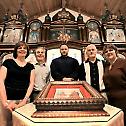Event toasts Balkan nation with food, music, dancing
Thousands of central Ohioans attend the Greek Festival every year, but the Serbian Festival, although similar, isn't as well-known.
"We have a long way to go to catch up to the Greeks," said Dave Tumbas, chairman of the festival at the St. Stevan of Dechani Serbian Orthodox Church.
"But for all the reasons that people love the Greek Festival, they'll love the Serbian Festival."
On Saturday, organizers hope to attract more than 1,000 people to the Northeast Side church for daylong performances by a Serbian orchestra, kolo dancing, children's activities and plenty of Serbian delicacies.
The menu includes two pit-roasted pigs and 12 lambs, a Serbian specialty, as well as sarma (cabbage rolls), cevaps (sausages), homemade pastries and Serbian beer and wine.
While church members call it the fourth annual festival, the event endured through the 1970s and 1980s until the breakout of the Bosnian War in 1992.
As more than 100,000 people were killed in the conflict stemming from the breakup of Yugoslavia, church members didn't find it appropriate to hold the celebration.
But almost two decades later, the war is actually responsible for the festival's resurgence: The size of the parish doubled when about 40 families emigrated from Serbia to join family or friends in Columbus.
Among them was Marko Stankovic, who relocated with his wife and two children in 1997 after struggling to find work as a plumbing engineer in a war-ravaged economy.
As the parishioners - most of whom had lived in America for years or generations - welcomed his family to the church, they, in turn, appreciated learning about Serbian culture from the newcomers.
"They are here long time; they forget some things," said Stankovic, 57, who found work as a facility manager. "Now, fresh people come and fresh tradition, too. It's good for them, good for us."
Tumbas has noticed that the festival food tastes more authentic now that it's made from scratch, with none of the shortcuts of convenient Americanized recipes.
He's also been on the " slava circuit," attending parties hosted by families in honor of their patron saint. Growing up with Serbian grandparents, he always went to church the morning of his family's slava, but now the celebrations are stop-everything, all-day affairs.
Such traditions inspired him and others to re-launch the festival, which they hope to expand beyond a gathering of friends and family to a community-wide event.
"It's really like a renaissance for a lot of us who were raised in the culture," Tumbas said. "Now, we're experiencing it as if we're really back in Serbia."
Source: www.dispatch.com


